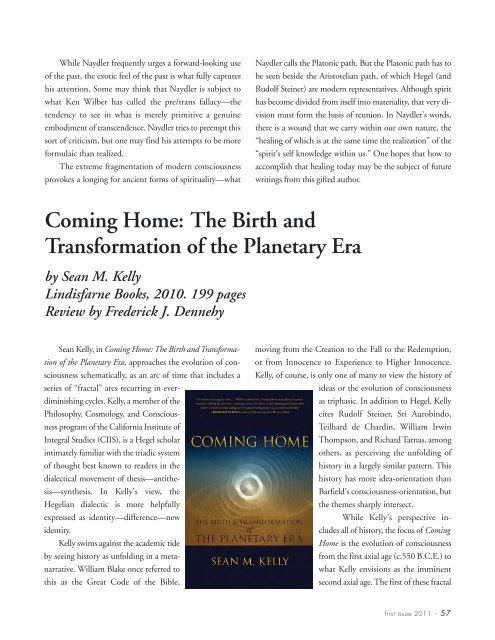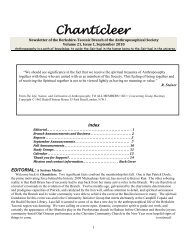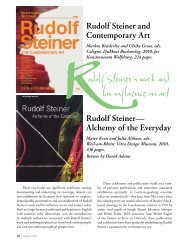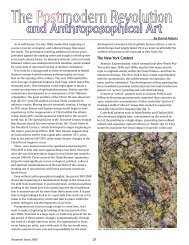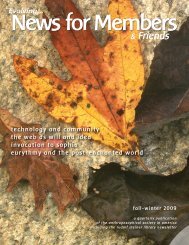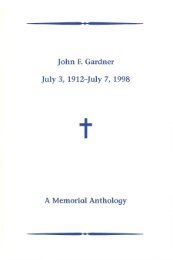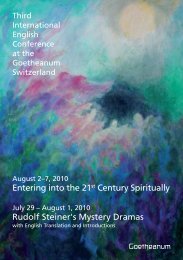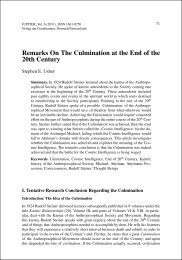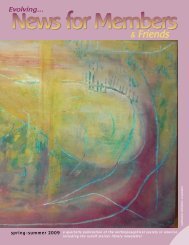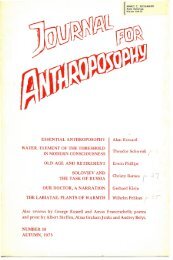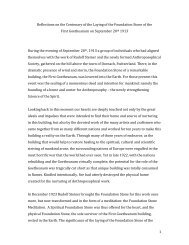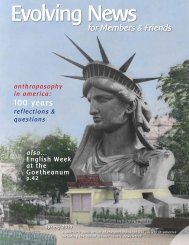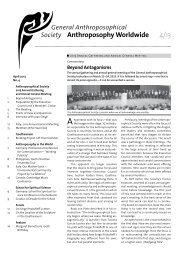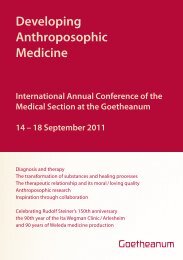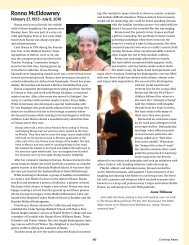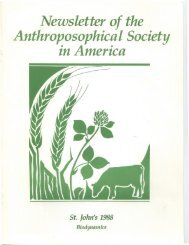Rudolf Steiner's Vision for the Future - Anthroposophical Society in ...
Rudolf Steiner's Vision for the Future - Anthroposophical Society in ...
Rudolf Steiner's Vision for the Future - Anthroposophical Society in ...
Create successful ePaper yourself
Turn your PDF publications into a flip-book with our unique Google optimized e-Paper software.
While Naydler frequently urges a <strong>for</strong>ward-look<strong>in</strong>g use<br />
of <strong>the</strong> past, <strong>the</strong> exotic feel of <strong>the</strong> past is what fully captures<br />
his attention. Some may th<strong>in</strong>k that Naydler is subject to<br />
what Ken Wilber has called <strong>the</strong> pre/trans fallacy—<strong>the</strong><br />
tendency to see <strong>in</strong> what is merely primitive a genu<strong>in</strong>e<br />
embodiment of transcendence. Naydler tries to preempt this<br />
sort of criticism, but one may f<strong>in</strong>d his attempts to be more<br />
<strong>for</strong>mulaic than realized.<br />
The extreme fragmentation of modern consciousness<br />
provokes a long<strong>in</strong>g <strong>for</strong> ancient <strong>for</strong>ms of spirituality—what<br />
Sean Kelly, <strong>in</strong> Com<strong>in</strong>g Home: The Birth and Trans<strong>for</strong>mation<br />
of <strong>the</strong> Planetary Era, approaches <strong>the</strong> evolution of consciousness<br />
schematically, as an arc of time that <strong>in</strong>cludes a<br />
series of “fractal” arcs recurr<strong>in</strong>g <strong>in</strong> everdim<strong>in</strong>ish<strong>in</strong>g<br />
cycles. Kelly, a member of <strong>the</strong><br />
Philosophy, Cosmology, and Consciousness<br />
program of <strong>the</strong> Cali<strong>for</strong>nia Institute of<br />
Integral Studies (CIIS), is a Hegel scholar<br />
<strong>in</strong>timately familiar with <strong>the</strong> triadic system<br />
of thought best known to readers <strong>in</strong> <strong>the</strong><br />
dialectical movement of <strong>the</strong>sis—anti<strong>the</strong>sis—syn<strong>the</strong>sis.<br />
In Kelly’s view, <strong>the</strong><br />
Hegelian dialectic is more helpfully<br />
expressed as identity—difference—new<br />
identity.<br />
Kelly swims aga<strong>in</strong>st <strong>the</strong> academic tide<br />
by see<strong>in</strong>g history as unfold<strong>in</strong>g <strong>in</strong> a metanarrative.<br />
William Blake once referred to<br />
this as <strong>the</strong> Great Code of <strong>the</strong> Bible,<br />
Naydler calls <strong>the</strong> Platonic path. But <strong>the</strong> Platonic path has to<br />
be seen beside <strong>the</strong> Aristotelian path, of which Hegel (and<br />
<strong>Rudolf</strong> Ste<strong>in</strong>er) are modern representatives. Although spirit<br />
has become divided from itself <strong>in</strong>to materiality, that very division<br />
must <strong>for</strong>m <strong>the</strong> basis of reunion. In Naydler’s words,<br />
<strong>the</strong>re is a wound that we carry with<strong>in</strong> our own nature, <strong>the</strong><br />
“heal<strong>in</strong>g of which is at <strong>the</strong> same time <strong>the</strong> realization” of <strong>the</strong><br />
“spirit’s self knowledge with<strong>in</strong> us.” One hopes that how to<br />
accomplish that heal<strong>in</strong>g today may be <strong>the</strong> subject of future<br />
writ<strong>in</strong>gs from this gifted author.<br />
Com<strong>in</strong>g Home: The Birth and<br />
Trans<strong>for</strong>mation of <strong>the</strong> Planetary Era<br />
by Sean M. Kelly<br />
L<strong>in</strong>disfarne Books, 2010. 199 pages<br />
Review by Frederick J. Dennehy<br />
mov<strong>in</strong>g from <strong>the</strong> Creation to <strong>the</strong> Fall to <strong>the</strong> Redemption,<br />
or from Innocence to Experience to Higher Innocence.<br />
Kelly, of course, is only one of many to view <strong>the</strong> history of<br />
ideas or <strong>the</strong> evolution of consciousness<br />
as triphasic. In addition to Hegel, Kelly<br />
cites <strong>Rudolf</strong> Ste<strong>in</strong>er, Sri Aurob<strong>in</strong>do,<br />
Teilhard de Chard<strong>in</strong>, William Irw<strong>in</strong><br />
Thompson, and Richard Tarnas, among<br />
o<strong>the</strong>rs, as perceiv<strong>in</strong>g <strong>the</strong> unfold<strong>in</strong>g of<br />
history <strong>in</strong> a largely similar pattern. This<br />
history has more idea-orientation than<br />
Barfield’s consciousness-orientation, but<br />
<strong>the</strong> <strong>the</strong>mes sharply <strong>in</strong>tersect.<br />
While Kelly’s perspective <strong>in</strong>cludes<br />
all of history, <strong>the</strong> focus of Com<strong>in</strong>g<br />
Home is <strong>the</strong> evolution of consciousness<br />
from <strong>the</strong> first axial age (c.550 B.C.E.) to<br />
what Kelly envisions as <strong>the</strong> imm<strong>in</strong>ent<br />
second axial age. The first of <strong>the</strong>se fractal<br />
first issue 2011 • 57


